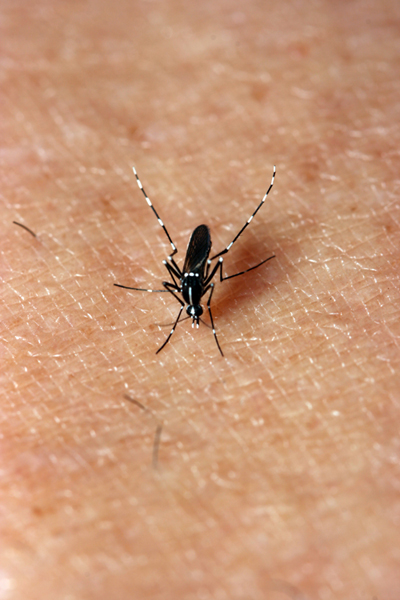Where are you on the mosquito attractiveness scale? Are you a “1” or a “10”? Me? I know that I’m more attractive to mosquitoes than my wife (she is much more susceptible to poison ivy… I think I’ll be content). I suspect that I’m not a ten, though. Several years ago I was asked to visit a Plano resident who was very upset about the mosquito problem around her home. After searching her yard and poking about the surrounding neighborhood, the city health official and I had not encountered a single mosquito. Yet the woman was adamant that the problem was unbearable. While she was talking, a mosquito came down and landed on her arm. First one we had seen all day. I left the home being thankful I wasn’t her.
Science seems to agree that people do vary substantially in their attractiveness to mosquitoes; but the exact mechanisms remain unknown. I spoke today with a friend and colleague, Dr. Mustapha Debboun, a military entomologist and one of the leading researchers on insect repellents in the U.S. “We know some people are more attractive to mosquitoes,” he said. “But we still don’t know exactly why, or all the compounds involved.”
It turns out that the question is difficult. Many studies suggest that this or that chemical is attractive to a certain type of mosquito; but results vary according to mosquito, the concentration of the particular chemical, and levels of other human odor components.
Depending on who you read, the number of human volatile chemicals emitted from the skin vary from 100 or so, to over 200 different compounds. We know that mosquitoes are attracted by some of these chemicals, especially carbon dioxide, lactic acid, and octenol. But things are more complicated. We know, for example, that some of the chemicals known to attract mosquitoes can be repellent in the wrong concentrations. Other chemicals we produce mostly repel mosquitoes. Add to this the fact that mosquitoes are also influenced by body heat and humidity, and the situation gets complex quickly. When given a choice, mosquitoes always prefer a real human to a trap emitting CO2, lactic acid and octenol.
One of the most recent areas of research interest is the effect of skin-inhabiting bacteria on body odor and attraction to mosquitoes. Despite our cultural obsession with cleanliness and daily showers, we all harbor lots of bacteria on our skin. Up to 3% of our total body weight is estimated to consist of the bacteria in our gut, in our mouths and nose and on our skin. Most skin bacteria are not necessarily harmful to us, but feed on the various oils and fatty acids emitted by the skin. The waste products of this daily banquet are chemical compounds excreted by bacteria, some of which are also attractive (or repellent) to mosquitoes.
I asked Debboun whether there was any truth to the fact that people who consume alcohol are more attractive to mosquitoes. I had read in a couple of sources that alcohol consumption seems to be one of the more well established factors that can increase a person’s attractiveness to mosquitoes. He admitted there was some anecdotal relationships between beer and bites, but insisted that even if it is true, we still lack solid evidence to show why alcohol would make us more attractive to mosquitoes. Similarly, he said, there is no proof that taking Vitamin B, as claimed by many, confers repellency to mosquitoes.
We know that some externally applied compounds can make us either repellent or chemically invisible to mosquitoes. The best example is DEET, the most popular and effective ingredient in insect repellents. In common use since the 1950s, scientists still argue about how exactly DEET works. It appears that DEET acts by blocking antennal receptors (where insects smell) to prevent them from sensing our body chemicals, especially lactic acid. But the complete picture of how DEET works so well is still debated.
Regardless of how they work, it is critical for all of us who spend time outdoors this summer to make use of a good repellent. For a comparison of the major repellents, see the repellent calculator provided by the U.S. Environmental Protection Agency.
One researcher suggests that perhaps the key is not how attractive we are to mosquitoes. It’s who we hang out with. To protect yourself from mosquitoes you just need to find someone who is more attractive than you are and hang out with them. Come to think of it, my wife must have figured that out a long time ago.
